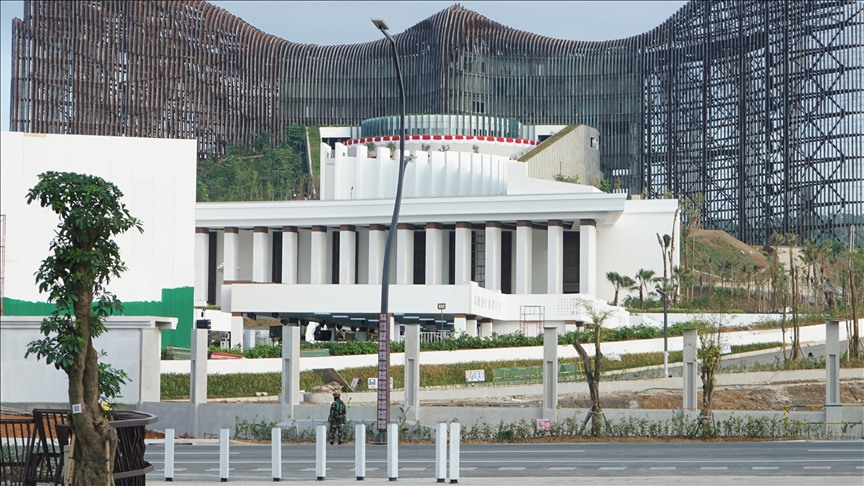Indonesia’s ambitious new capital Nusantara faces ‘ghost city’ fears
Drastic funding cuts, construction delays and dwindling population cast doubt on future of megaproject, say media reports
 Military personnel conduct patrol near Istana Garuda at Indonesia’s new capital city Nusantara in Sepaku, Penajam Paser Utara District, East Kalimantan, Indonesia on August 12, 2024.
Military personnel conduct patrol near Istana Garuda at Indonesia’s new capital city Nusantara in Sepaku, Penajam Paser Utara District, East Kalimantan, Indonesia on August 12, 2024.
ANKARA
Indonesia’s futuristic new capital, Nusantara, once envisioned as a model green city to replace overcrowded and sinking Jakarta, is now facing growing concerns it may become a “ghost city,” amid funding cuts, sluggish construction, and minimal relocation of public servants, according to media reports.
Located deep in the forests of East Kalimantan on Borneo Island, Nusantara has seen a dramatic drop in state funding under President Prabowo Subianto, from £2 billion ($2.4 billion) in 2024 to £700 million ($850 million) in 2025, The Guardian reported on Wednesday.
Just £300 million ($365 million) is allocated for next year, which is a third of what officials had requested.
Private investment has also fallen more than £1 billion ($1.22 billion) short of its target.
The president, who assumed office in October 2024, has yet to visit the site.
In May, he quietly reclassified Nusantara as a “political capital,” a status change only made public in September.
Only about 2,000 civil servants and 8,000 construction workers currently live in the city, far below the 2030 target of 1.2 million.
While ministry buildings, roads, hospitals, and a presidential palace have been constructed, much of the city remains unfinished.
Despite this, Nusantara Capital Authority chief Basuki Hadimuljono defended the project, saying: “The funding is there, the political commitment is there. Why should we doubt that?”
He claimed that budget cuts were “reallocated, not cut,” and cited Prabowo’s personal promise to “finish this even faster.”
However, residents and businesses around Nusantara report a stark slowdown.
“Now, my income has dropped by half,” Dewi Asnawati, who runs a local shop, was quoted by the newspaper as saying. Others, like stallholder Syarariyah, described the boom-and-bust pattern as workers left.
Environmental and Indigenous groups also raised an alarm.
The NGO Walhi said over 2,000 hectares (4,940 acres) of mangrove forest have been destroyed.
Balik communities say water pollution and flooding have worsened, cutting harvests and limiting access to clean water.
While the government denies these claims, critics argue that Nusantara has done more harm than good to local communities.
Even visitors notice the eerie calm.
“It feels like Singapore,” said Clariza, a tourist from Sulawesi.
“Clean, modern—but it’s also strange and quiet. There’s nobody here yet.”
Anadolu Agency website contains only a portion of the news stories offered to subscribers in the AA News Broadcasting System (HAS), and in summarized form. Please contact us for subscription options.







